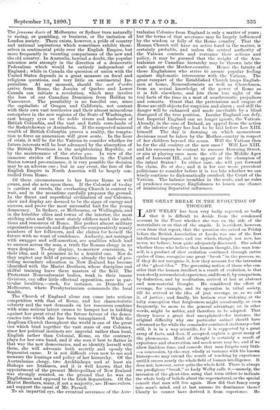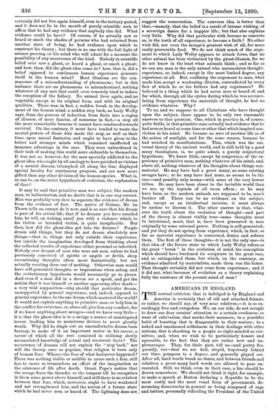THE GREAT BREAK IN THE EVOLUTION OF THOUGHT.
TADY WELBY has been very badly reported, so badly that it is difficult to decide from the condensed account in the Times whether she was on the side of the materialists or on that of the angels. It is evident, however, even from that report, that the question she raised on Friday before the British Association at Leeds, was one of the first, intellectual importance, and one which, though not new, has never, we believe, been quite adequately discussed. She asked whether those who believe that human thought, like man him- self, is a product of slow evolution continued through entire cycles of time, recognise one great " break " in the process, or, if they do not recognise it, how they account for the intrusion of the " ghost-idea." The governing notion of those who con- sider that the human intellect is a result of evolution, is that man slowly accumulated experience, and from it, by comparison, by deduction, and by meditation, arrived at last at abstract and non-material thought. He considered the effect of revenge, for example, and its operation in tribal society, till he arrived at the idea of just revenge, or, as we call it, of justice ; and finally, his horizon ever widening, at the lofty conception that forgiveness might occasionally, or even frequently, be more to the general advantage, or, in other words, might be nobler, and therefore to be adopted. That theory leaves a great deal unexplained—for instance, the original difficulty why one particular animal should have advanced so far while the remainder continued stationary—but still, it is in a way scientific, for it is supported by a great array of facts, and does, if accepted, explain a great many of the phenomena. Mach of thought is certainly a result of experience and observation, and much more may be; and if we allow limitless time, and concede that man forgets very little —a concession, by-the-way, wholly at variance with his known history—we may extend the result of teaching by experience, until it covers nearly the whole field of human intelligence. It does not, however, cover quite the whole field. There is always one prodigious " break," as Lady Welby calls it,—namely, the intrusion of the ghost-idea, using that term either to indicate the whole body of beliefs about the supernatural, or the special conceit that man will live again. How did that fancy creep into man's mind, and at last assume its dominance there P. Clearly he cannot have derived it from experience. He
certainly did not live again himself, even in the tertiary period, and it does not lie in the month of purely scientific men to affirm that he had any evidence that anybody else did. What evidence could he have P Of course, if he actually saw or heard or smelt the shades of persons who had returned from another state of being, he had evidence upon which to construct his theory ; but there is no one with the full light of science pouring on his mind who will admit for a moment the possibility of any occurrence of the kind. Nobody in scientific belief ever saw a ghost, or heard a ghost, or smelt a ghost; and how, then, did the ghost-idea come in how, that is, did a belief opposed to continuous human experience generate itself in the human mind? Most illusions are the con- sequence of a misunderstanding of phenomena; but in this instance there are no phenomena to misunderstand, nothing whatever of any sort that could even remotely tend to induce the reception of the fallacy. No animal lives again, and no vegetable, except in its original form, and with its original qualities. There was, in fact, a sudden break in the develop- ment of the human mind, a sadden step back, as Lady Welby says, from the process of induction from facts into a region of illusion, of mere fancies, of nonsense in fact,—a step all the more remarkable because it cannot-have conduced towards survival. On the contrary, it must have tended to waste the mental powers of those who made the step, as well as their time, upon unreal fantasies, and ought to have given to the better and stronger minds which remained unaffected an immense advantage in the race. They were unburdened in their task of making this world more endurable to themselves. It was not so, however, for the men specially addicted to the ghost-idea, who ought by all analogy to have perished as victims of a mental disease, triumphed all along the line, displayed special faculty for continuous progress, and are now more gifted than any other division of the human species. What is, or can be, on the strict hypothesis of evolution, the explanation of that ?
It may be said that primitive man was subject, like modern man, to hallucination, and no doubt that is in one way correct. Man was probably very slow to separate the evidence of dream from the evidence of fact. • The native of Guiana, Mr. im Thurn tells us, cannot do it now, and is so sure that his dream is part of his actual life, that if he dreams you have assailed him, he will, on waking, assail you with a violence which, to his victim or intended victim, is quite inexplicable. But then, how slid the ghost-idea get into the dreams ? People dream odd things, but they do not dream absolutely new things,—that is, things not only outside their experience, but outside the imagination developed from thinking about the collected results of experience either personal or inherited. Nobody ever dreamt of men who were not men, unless he had previously conceived of spirits or angels or devils, sleep recombining thoughts often most fantastically, but not actually creating them out of nothing. Otherwise man would have self-generated thoughts or impressions when asleep, and the evolutionary hypothesis would necessarily go to pieces. And even if a man did in a dream see a spook, and get the notion that it was himself or another appearing after death- s very wild supposition—why should that particular dream, unsupported by general experience, and, indeed, opposed to general experience, be the one dream which mastered the world? It would not explain anything to primitive man, or help him in the conflict for existence, or, above all, give him any comfort; for if we know anything about savages—and we know very little— it is that the ghost-idea is to a savage a source of unmitigated terror, leading him to monstrous devices to avert ghostly wrath. Why did he single out an uncomfortable dream-born fantasy, to make of it an important motor in his career, a career of which all the rest consisted in utilising slowly accumulated knowledge of actual and recurrent facts ? The occurrence of dreams will not explain the " step back," nor will the theory, once so popular, that religion is born only of human fear. Whence the fear of what had never happened P There was nothing visible or audible to cause such a fear, still less to cause so tremendous an effort of the imagination as the existence of life after death. Grant Pope's notion that the savage fears the thunder or the tempest till he recognises in them some power above himself, and still there is no relation between that fear, which, moreover, ought to have weakened and not strengthened him, and the notion of a future state which he had never seen or heard of. The lightning does not
suggest the resurrection. The converse idea is better than that,—namely, that the belief is a result of intense wishing, of a sovereign desire for a happier life; but that also explains very little. Why did that particular wish become so concrete as, in the teeth of all experience, to become a faith ? No other wish did, not even the savage's greatest wish of all, for more easily procurable food. We do not think much of the argu- ment to which Lady Welby appears to attach force, that no other animal has been victimised by the ghost-illusion, for we do not know in the least what animals think ; and so far as we can see, man is the only animal who accumulates thought- experience, or, indeed, except in the most limited degree, any experience at all. But, confining the argument to man, what made him accept a weakening illusion, contradicted by every fact of which he or his fathers had any cognisance? He believed in a thing which he had never seen or heard of, and for which, through all the cycles during which he was accumu- lating from experience the materials of thought, hi had no evidence whatever. Why ?
To us, and we suppose to all Christians who have thought upon the subject, there appear to be only two reasonable answers to that question. One, which in practice is, of course, quite futile, is that primitive man actually had evidence that he had seen or heard at some time or other that which inspired con- viction in his mind. He became as sure of another life as of the action of sunlight, and for the same reason, because he had watched its manifestations. This, which was the uni- versal theory of the ancient world, and is still held by a good many theologians, is, we quite admit, a purely conjectural hypothesis. We know little, except by conjecture, of the ex- perience of primitive man, nothing whatever of his mind, and, above all, nothing whatever of his thoughts about things non- material. He may have had a great many, as some existing savages have ; or he may have had none, as seems to be the case—and possibly only seems—with some of the very lowest tribes. He may have been closer to the invisible world, than we are, as the legends of all races affirm ; or he may have been, as the modern animals are supposed to be, much further off. There can be no evidence on the subject, and, except as an intellectual exercise, it must always be useless to discuss it. The other answer is that, what- ever the truth about the evolution • of thought—and part of the theory is ,almost visibly true—some thoughts must be intuitional, must, that is, have been generated in man originally by some external power. Nothing is self-generated; and yet they do not spring from experience, which, in fact, so far as material experience is concerned, denies and refutes them. The first of those thoughts—it is not the only one—is that idea of the future state to which Lady Welby refers as the great " break " in the evolution of mind, the conception which should have burdened its recipients in the great race, and so extinguished them, but which, on the contrary, on evidence admitted by materialists, made them run the faster. That thought certainly did not come from experience ; and if it did not, what becomes of evolution as a theory explaining fully the existence of the present mind of man







































 Previous page
Previous page